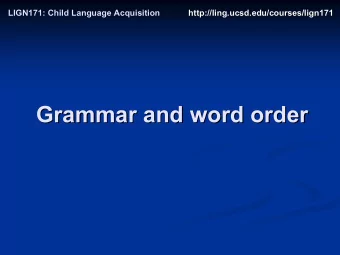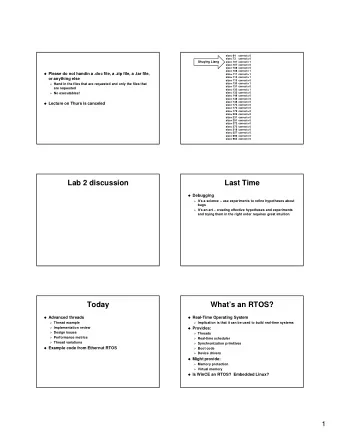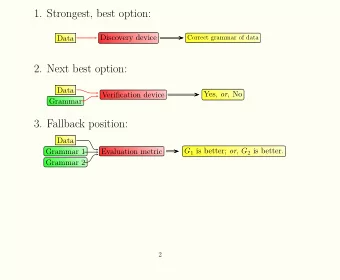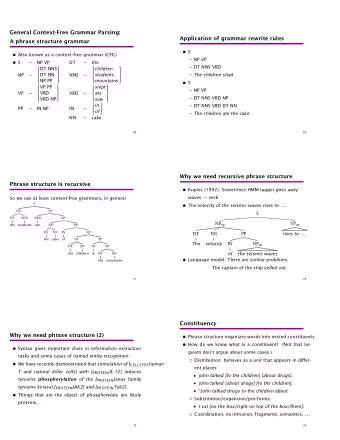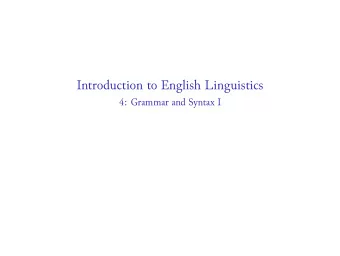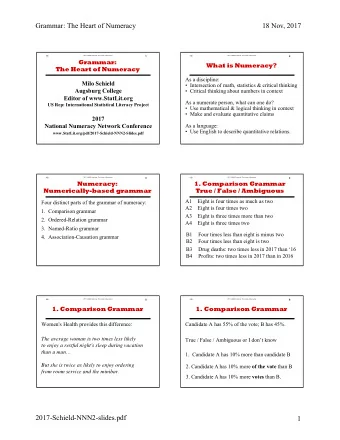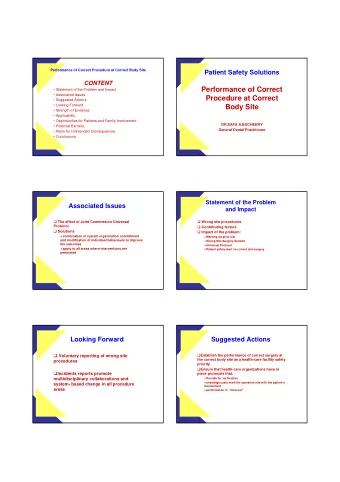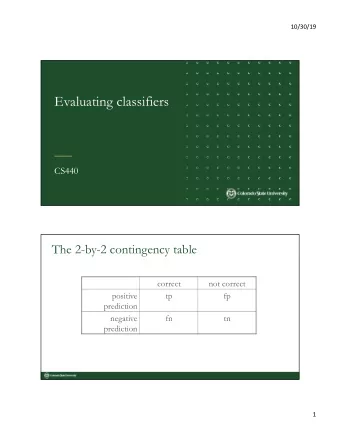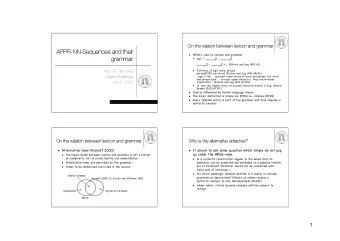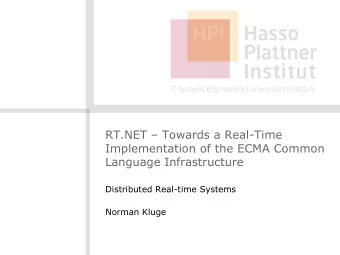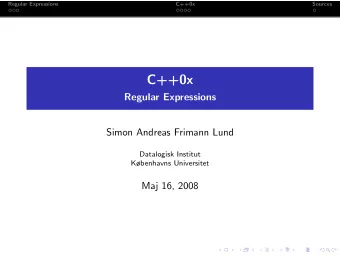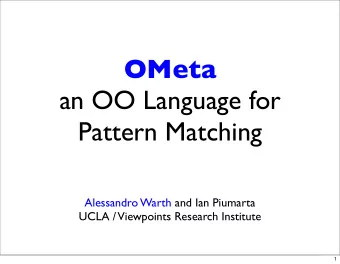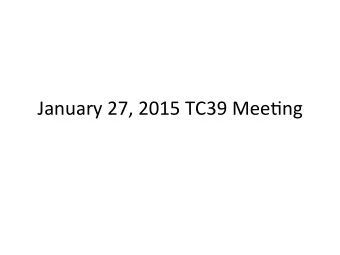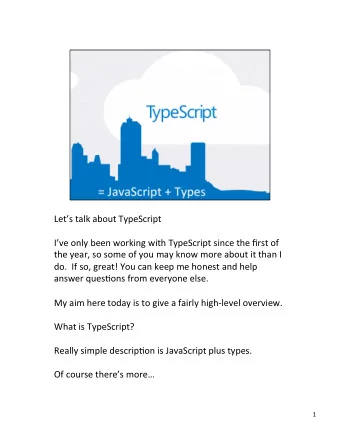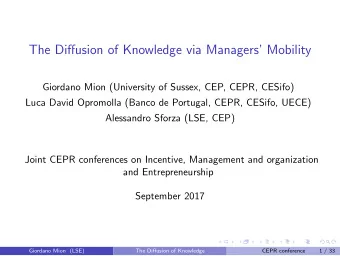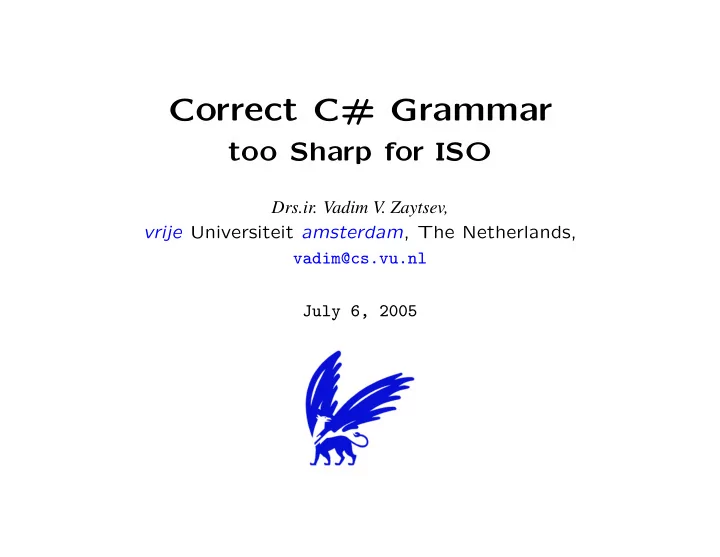
Correct C# Grammar too Sharp for ISO Drs.ir. Vadim V. Zaytsev, - PowerPoint PPT Presentation
Correct C# Grammar too Sharp for ISO Drs.ir. Vadim V. Zaytsev, vrije Universiteit amsterdam , The Netherlands, vadim@cs.vu.nl July 6, 2005 Parse tree of the research Programming languages working working C# parser COBOL ... parser
Correct C# Grammar too Sharp for ISO Drs.ir. Vadim V. Zaytsev, vrije Universiteit amsterdam , The Netherlands, vadim@cs.vu.nl July 6, 2005
Parse tree of the research Programming languages working working C# parser COBOL ... parser working working transformations transformations grammar grammar ... ... anonymising grammar grammar GOTO elimination recovery recovery API migration code refactoring specification manuals ... ISO ISO ECMA IBM 1
Traversal for this presentation Programming languages working working C# parser COBOL ... parser working working transformations transformations grammar grammar ... ... anonymising grammar grammar GOTO elimination recovery recovery API migration code refactoring specification manuals ... ISO ISO ECMA IBM 2
COBOL • The most used programming language • Large systems (10000000+ lines of code) • Standardised by ISO, dialects by vendors • Legacy : systems not understood, hardware outdated, manuals incomplete • Experience : IBM VS COBOL II Reference Summary transformed; cooperation with ISO 3
“New stuff” • Mainstream yet new language: • Visual Basic? • Java? • C#? • Made by the big corporation, approved by ISO and ECMA International 4
C# specification • Three diffently formatted versions: • ECMA 334 • ISO/IEC 23270:2003 (free) • Microsoft-ECMA • 500 pages of English (conditionally normative) text • Formal (BNF-like) appendix with a grammar (informative text) 5
Example: not quite BNF letter-character:: A Unicode character of classes Lu, Ll, Lt, Lm, Lo, or Nl A unicode-character-escape-sequence representing a character of classes Lu, Ll, Lt, Lm, Lo, or Nl decimal-digit:: one of 0 1 2 3 4 5 6 7 8 9 integer-type-suffix:: one of U u L l UL Ul uL ul LU Lu lU lu • unicode-character-escape-sequence is a non-terminal • Unicode classes are defined elsewhere 6
Example: duplicates A.2.4 Expressions ... constant-expression: expression boolean-expression: expression A.2.5 Statements ... if-statement: "if" "(" boolean-expression ")" embedded-statement "if" "(" boolean-expression ")" embedded-statement "else" embedded-statement boolean-expression: expression 7
Example: semantics & ambiguities A.2.1 Basic concepts namespace-name: namespace-or-type-name type-name: namespace-or-type-name namespace-or-type-name: identifier namespace-or-type-name "." identifier A.2.2 Types type: value-type | reference-type value-type: struct-type | enum-type struct-type: type-name | simple-type enum-type: type-name reference-type: class-type | interface-type | array-type | delegate-type class-type: type-name | "object" | "string" interface-type: type-name delegate-type: type-name 8
Example: needless complications block: "{" statement-list? "}" statement-list: statement statement-list statement • block:: "{" statement* "}" • More straightforward, less non-terminals, left recursion is not preferred. 9
Example: obvious ambiguities A.2.6 Classes static-constructor-modifiers: "extern"? "static" "static" "extern"? 25.1 Unsafe constructs static-constructor-modifiers: "extern"? "unsafe"? "static" "unsafe"? "extern"? "static" "extern"? "static" "unsafe"? "unsafe"? "static" "extern"? "static" "extern"? "unsafe"? "static" "unsafe"? "extern"? 10
Example: yacc ification expression: conditional-expression assignment conditional-expression: conditional-or-expression conditional-or-expression "?" expression ":" expression conditional-or-expression: conditional-and-expression conditional-or-expression "||" conditional-and-expression conditional-and-expression: inclusive-or-expression conditional-and-expression "&&" inclusive-or-expression inclusive-or-expression: exclusive-or-expression inclusive-or-expression "|" exclusive-or-expression exclusive-or-expression: and-expression exclusive-or-expression "^" and-expression ... 11
Example: yacc ified parse tree conditional−expression expression conditional−or−expression conditional−expression conditional−and−expression conditional−or−expression inclusive−or−expression conditional−and−expression exclusive−or−expression inclusive−or−expression and−expression exclusive−or−expression unary−expression expression equality−expression and−expression primary−expression unary−expression relational−expression equality−expression literal primary−expression shift−expression relational−expression "2" literal additive−expression shift−expression multiplicative−expression additive−expression unary−expression multiplicative−expression primary−expression unary−expression literal primary−expression "2" literal 12
Example: yacc ified parse tree conditional−expression expression conditional−or−expression conditional−expression conditional−and−expression conditional−or−expression inclusive−or−expression conditional−and−expression exclusive−or−expression inclusive−or−expression and−expression exclusive−or−expression unary−expression expression equality−expression and−expression primary−expression unary−expression relational−expression equality−expression literal primary−expression shift−expression relational−expression "2" literal additive−expression shift−expression multiplicative−expression additive−expression unary−expression multiplicative−expression primary−expression unary−expression literal primary−expression "2" literal 13
Example: redundancy method-body: block ";" accessor-body: block ";" operator-body: block ";" constructor-body: block ";" static-constructor-body: block ";" destructor-body: block ";" 14
Example: inconsistency § 22.1 Delegate declarations, page 297 (lines 15–16 in Msft version) delegate-declaration: attributes? delegate-modifiers? "delegate" return-type identifier "(" formal-parameter-list? ")" ";" Appendix A.2.11 Delegates, page 357 (lines 34–35 in Msft version) delegate-declaration: attributes? delegate-modifiers? "delegate" type identifier "(" formal-parameter-list? ")" ";" • (No) void allowed for delegates 15
Other examples • § 25 Unsafe code (pages 317–334) • Appendix A.3 Grammar extensions for unsafe code (pages 359–360) • Inane ambiguities: + +x vs ++x (and -+x ) 16
G rammar D eployment K it • LLL: EBNF-based grammar format • Grammar transformations: • %rename sort %to sort • %redefine rule %to rule • %include rule and %exclude rule • %eliminate sort • %introduce rule 17
ASF+SDF Meta-Environment • SDF — Syntax Definition Formalism • Parsing technology: SGLR (Scannerless Generalised Left- to-right with Rightmost derivation) • All non-circular context-free grammars allowed, modular • ASF — Algebraic Specification Formalism • Rewriting rules • Traversal functions • It compiles to C • Meta-Environment: the connecting GUI • And the infrastructure that ties it all together 18
Grammar transformations • Grammar transformations are a bit different from source code transformations • Grammar − → specification or documentation • Grammar − → dialect or implementation • Grammar − → next version of a grammar • http://www.cs.vu.nl/grammars/browsable/ 19
Conclusion: methods • Grammar recovery is a technique for extracting a complete grammar out of: • an existing programming language’s manual • a standardised specification • compiler’s source code, • assessing it, correcting, testing, etc • PLEX (1998), VS COBOL II (1999–2005), PL/I (1999), Ada 95 (2000), Fortran, C, C# 20
Conclusion: statements • Grammar recovery is needed also for new languages • Specifications should be (but are not) free from: • technical details • misprints • inconsistencies • invalid code • Specification Deployment Kit. . . 21
Stay tuned! 22
Grammar engineering parsing problems grammar hacking grammar engineering time 0 • “Grammar engineering” approach works fine with specs, too. 23
Recommend
More recommend
Explore More Topics
Stay informed with curated content and fresh updates.

